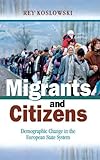Migrants and Citizens : Demographic Change in the European State System / Rey Koslowski.
Material type: TextPublisher: Ithaca, NY : Cornell University Press, [2018]Copyright date: ©2000Description: 1 online resource (256 p.) : 8 tablesContent type:
TextPublisher: Ithaca, NY : Cornell University Press, [2018]Copyright date: ©2000Description: 1 online resource (256 p.) : 8 tablesContent type: - 9781501731785
- 325.4 23
- JV7590 .K67 2000eb
- online - DeGruyter
| Item type | Current library | Call number | URL | Status | Notes | Barcode | |
|---|---|---|---|---|---|---|---|
 eBook
eBook
|
Biblioteca "Angelicum" Pont. Univ. S.Tommaso d'Aquino Nuvola online | online - DeGruyter (Browse shelf(Opens below)) | Online access | Not for loan (Accesso limitato) | Accesso per gli utenti autorizzati / Access for authorized users | (dgr)9781501731785 |
Browsing Biblioteca "Angelicum" Pont. Univ. S.Tommaso d'Aquino shelves, Shelving location: Nuvola online Close shelf browser (Hides shelf browser)

|

|

|

|

|

|

|
||
| online - DeGruyter Roman Comedy / | online - DeGruyter State and Society in Contemporary Korea / | online - DeGruyter Korean Workers : The Culture and Politics of Class Formation / | online - DeGruyter Migrants and Citizens : Demographic Change in the European State System / | online - DeGruyter Bolingbroke and His Circle : The Politics of Nostalgia in the Age of Walpole / | online - DeGruyter Broadcasting Politics in Japan : NHK and Television News / | online - DeGruyter Reading Families : Women's Literate Practice in Late Medieval England / |
Frontmatter -- Contents -- Acknowledgments -- Introduction -- Part 1. Theoretical Issues -- 1. Migration and the Conceptualization of World Politics -- 2. European Integration and State Sovereignty -- Part 2. Demography Shaping Political Institutions -- 3. Nation-States -- 4. Citizenship -- 5. Political Union -- Part 3. Migration, Citizenship, and the Emerging European Polity -- 6. European Union Citizenship -- 7. Dual Nationality -- 8. Border Control and State Sovereignty -- Conclusion -- Notes -- References -- Index
restricted access online access with authorization star
http://purl.org/coar/access_right/c_16ec
The Berlin Wall falls as thousands of East Germans move to the West; after the Iron Curtain lifts, West Europeans brace for mass migrations from Eastern Europe; millions of refugees flee Iraq, Bosnia, Haiti, Rwanda, and other strife-torn nations. The shifting tides of international migration have had a profound effect on our world, from the transformation of nationality laws and European cooperation on border control to NATO intervention in Kosovo. In Migrants and Citizens, Rey Koslowski examines the impact of migration on international politics. He focuses on two related avenues of inquiry: the immediate political problems faced by the European Union, and the general issues that confront us as we try to understand the modern international system.Migration has become politically salient so quickly, Koslowski argues, because the nation-state and the political institutions associated with it developed in the centuries during which Western Europe was a net exporter of people. With the reversal of that trend less than a generation ago, many of these institutions have been ill-suited to deal with the political and policy demands brought on by the arrival of large numbers of foreigners.Koslowski discusses how restrictive citizenship laws exclude migrants and their children from political participation in some West European states, leading observers to question the legitimacy of those states as democracies. Yet when these states try to increase immigrant participation with local voting rights, European Union citizenship, and dual nationality, the principle of a singular nationality underlying the nation-state is challenged. In this way, the practical policy responses to migration gradually transform the political institutions of states as well as the international system they collectively constitute.
Mode of access: Internet via World Wide Web.
In English.
Description based on online resource; title from PDF title page (publisher's Web site, viewed 26. Apr 2024)


